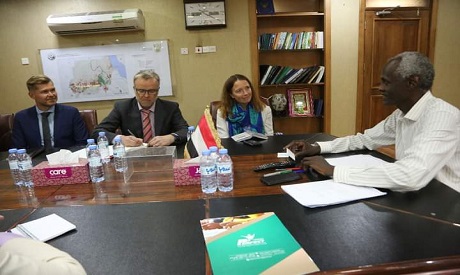
Sudanese Irrigation Minister Yasser Abbas (R) during his meeting with a delegation from the European Union to discuss the latest developments on the long-running dispute caused by the Ethiopian Renaissance Dam on Wednesday, 2 June 2021 (Photo courtesy of the Sudanese irrigation ministry)
Sudan's Irrigation Minister has told a European Union (EU) delegation that Ethiopia's position on the dispute caused by the Grand Ethiopian Renaissance Dam (GERD) has shifted "suddenly" to Nile waters quotas after ten years of negotiations over GERD's filling and operation rules.
Sudan, alongside the other downstream country Egypt, has been in negotiations with Ethiopia for a decade now to reach an agreement regulating the rules of filling and operating the controversial dam as both Khartoum and Cairo view it as a threat to their water security in the absence of such a deal.
"The negotiations were only limited, over nearly ten years, to striking a deal on the filling and operation [rules] per the Declaration of Principles signed in 2015 between the three nations," Sudanese Irrigation Minister Yasser Abbas said in a meeting on Wednesday with a EU delegation, whose member are in a visit to the Nile basin country.
"However, Ethiopia changed its position abruptly and started talking about sharing water quotas, a matter that Sudan categorically rejects," the Sudanese minister said.
Under two water treaties dating back to 1902 and 1929, Sudan's share of the Nile stands at 18.5 billion cubic metres, while Egypt's stands at 55.5 billion cubic metres.
Despite Ethiopia's embarking on building its controversial dam on grounds of generating electricity, it has been recently trying to impose the idea of discussing the agreements of the Nile waters quotas on the agenda of the currently-stalled negotiations, a matter that Egypt and Sudan reject.
During the EU meeting, Abbas explained that his country supported Ethiopia using the Nile water as per the international rivers law, adding that the dam would bring "several" benefits to Sudan, but that it would turn "grave" if a binding legal agreement is not signed.
Minister Abbas said the threats are looming due to the proximity of the GERD to the Sudanese Roseires Dam, a matter that could cause environmental harm to Sudan, according to a statement by the Sudanese irrigation ministry.
Tensions have escalated recently between downstream countries and Ethiopia over the lack of an agreement on the filling and operation of the dam.
Ethiopia plans to hold 13.5 billion cubic metres of water during the second filling of the GERD’s reservoir in July, despite the objections of Egypt and Sudan to the move in the absence of a legally binding instrument.
Negotiation between the three countries has stalled in January as Ethiopia rejected several proposals by Egypt and Sudan to improve the decade-old negotiation mechanism.
The three countries have resorted to international diplomacy in the past weeks, briefing regional and international counterparts on their stances and developments in the latest deadlock in negotiations.
Abbas urged for a change in the negotiations methodology so as to make the GERD a start for cooperation between the three countries.
Short link: